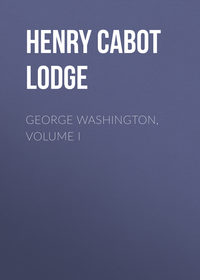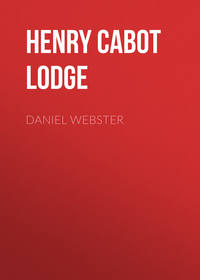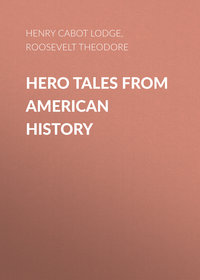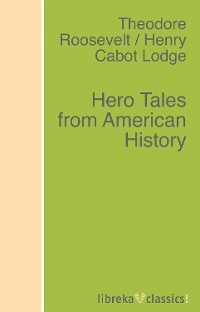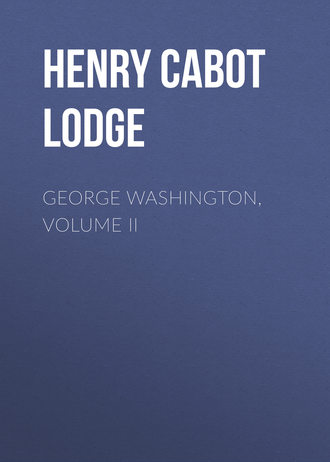 полная версия
полная версияGeorge Washington, Volume II
So the President traveled on to the North, and then back by another road to New York, and that excellent bit of work in familiarizing the people with their federal government was accomplished. Meantime the wheels had started, the machine was in motion, and the chief officers were at their places. The preliminary work had been done, and the next step was to determine what policies should be adopted, and to find out if the new system could really perform the task for which it had been created.
CHAPTER III
DOMESTIC AFFAIRS
To trace in detail the events of Washington's administration would be to write the history of the country during that period. It is only possible here to show, without much regard to chronological sequence, the part of the President in developing the policy of the government at home, and his attitude toward each question as it arose. We are concerned here merely with the influence and effect of Washington in our history, and not with the history itself. What did he do, and what light do we get on the man himself from his words and deeds? These are the only questions that a brief study of a career so far-reaching can attempt to answer.
Congress came together for the first time with the government actually organized on January 4, 1790. On the day when the session opened, Washington drove down to the hall where the Congress met, alone in his own coach drawn by four horses. He was preceded by Colonel Humphreys and Major Jackson, mounted on his two white horses, while immediately behind came his chariot with his private secretaries, and Mr. Lewis on horseback. Then followed in their own coaches the chief justice and the secretaries of war and of the treasury. When the President reached the hall he was met at the entrance by the doorkeeper of the Congress, and was escorted to the Senate chamber. There he passed between the members of each branch, drawn up on either hand, and took his seat by the Vice-President. When order and silence were obtained, he rose and spoke to the assembled representatives of the people standing before him. Having concluded his speech, he bowed and withdrew with his suite as he had come. Jefferson killed this simple ceremonial, and substituted for it the written message, sent by a secretary and read by a clerk in the midst of talk and bustle, which is the form we have to-day. Jefferson's change was made, of course, in the name of liberty, and also because he was averse to public speaking. From the latter point of view, it was reasonable enough, but the ostensible cause was as hollow and meaningless as any of the French notions to which it was close akin. It is well for the head of the state to meet face to face the representatives of the same people who elected him. For more than a century this has been the practice in Massachusetts, to take a single instance, and liberty in that commonwealth has not been imperiled, nor has the State been obliged to ask Federal aid to secure to her a republican form of government because of her adherence to this ancient custom.
The forms adopted by Washington had the grave and simple dignity which marked all he did, and it was senseless to abandon what his faultless taste and patriotic feeling approved. Forms are in their way important things: they may conceal perils to liberty, or they may lend dignity and call forth respect to all that liberty holds most dear. The net result of all this business has been very curious. Jefferson's written message prevails; and yet at the same time we inaugurate our Presidents with a pomp and parade to which those of the dreaded Federalists seem poor and quiet, and which would make the hero of the message-in-writing fancy that the air was darkened by the shadows of monarchy and despotism. The author of the Declaration of Independence was a patriotic man and lover of freedom, but he who fought out the Revolution in the field was quite as safe a guardian of American liberty; and his clear mind was never confused by the fantasies of that Parisian liberty which confused facts with names, and ended in the Terror and the first Empire. The people of the United States to-day surround the first office of the land with a respect and dignity which they deem equal to the mighty sovereignty that it represents, and in this is to be found the genuine American feeling expressed by Washington in the plain and simple ceremonial which he adopted for his meetings with the Congress.
In this first speech, thus delivered, Washington indicated the subjects to which he wished Congress to direct their attention, and which in their development formed the policies of his administration. His first recommendation was to provide for the common defense by a proper military establishment. His last and most elaborate was in behalf of education, for which he invoked the aid of Congress and urged the foundation of a national university, a scheme he had much at heart, and to which he constantly returned. The history of these two recommendations is soon told. Provision was made for the army, inadequate enough, as Washington thought, but still without dispute, and such additional provision was afterwards made from time to time as the passing exigency of the moment demanded. For education nothing was done, and the national university has never advanced beyond the recommendation of the first President.
He also advised the adoption of a uniform standard of coinage, weights, and measures. In two years a mint was duly established after an able report from Hamilton, and out of his efforts and those of Jefferson came our decimal system. There was debate over the devices on the coins in which the ever-vigilant Jeffersonians scented monarchical dangers, but with this exception the country got its uniform coinage peacefully enough. The weights and measures did not fare so well. They obtained a long report from Jefferson, and a still longer and more learned disquisition from John Quincy Adams thirty years later. But that was all. We still use the rule of thumb systems inherited from our English ancestors, and Washington's uniform standard, except for the two reports, has gone no further than the national university.
Another recommendation to the effect that invention ought to be encouraged and protected bore fruit in this same year in patent and copyright laws, which became the foundation of our present system. The same good fortune befell the recommendation for a uniform rule for naturalization, and the law of 1790 was quietly enacted, no one then imagining that its alteration less than ten years later was destined to form part of a policy which, after a fierce struggle, settled the fate of parties and decided the control of the government. The post-office was also commended to the care of Congress, and for that, as for the army, provision was duly made, insufficient at the outset, but growing steadily from this small beginning, as it was called upon to meet the spread and increase of population.
Provision was also made gradually, and with much occasional conflict, for a diplomatic service such as the President advised. But this was merely the machinery to carry out our foreign policy on which, in a few years, our political history largely turned, and which will demand a chapter by itself.
A paragraph devoted to Indian affairs informed Congress that measures were on foot to establish pacific relations with our savage neighbors, but that it would be well to be prepared to use force. This brief sentence was the beginning of an important policy, which, in its consequences and effects, played a large part in the history of the next eight years.
These various matters thus disposed of, there remained only the request to the House to provide for the revenue and the public credit. From this came Hamilton's financial policy which created parties, and with it was interwoven in the body of the speech the general recommendation to make all proper effort for the advancement of manufactures, commerce, and agriculture.
The speech as a whole, short though it was, drew the outline of a vigorous system, which aimed at the establishment of a strong government with enlarged powers. It cut at a blow all ties between the new government and the feeble strivings of the dead confederation. It displayed a broad conception of the duties of the government under the Constitution, and in every paragraph it breathed the spirit of a robust nationality, calculated to touch the people directly in every State of the Union.
Before taking up the financial question, which became the great issue in our domestic affairs, it will be well to trace briefly the story of our relations with the Indians. The policy of the new administration in this respect was peculiarly Washington's own, and, although it affected more or less the general course of events at that period, it did not directly become the subject of party differences. The "Indian problem" is still with us, but it is now a very mild problem indeed. Within a few years, it is true, we have had Indian wars, conducted by the forces of the United States, and ever-recurring outbreaks between savages and frontiersmen. But it has been a very distant business. To the great mass of the American people it has been little more than interesting news, to be leisurely scanned in the newspaper without any sense of immediate and personal concern. Moreover, the popular conception of the Indian has for a long time been wildly inaccurate. We have known him in various capacities, as the innocent victim of corrupt agents and traders, and as the brutal robber and murderer with the vices and force of the Western frontiersman, but without any of the latter's redeeming virtues. Last and most important of all, we have known him as the rare hero and the conventional villain of romance, ranging from the admirable stories of Cooper to the last production of the "penny dreadful." The result has been to create in the public mind a being who probably never existed anywhere except in the popular imagination, and who certainly is not the North American Indian.
We are always loath to admit that our conceptions are formed by fiction, but in the case of people remote from our daily observation it plays in nine instances out of ten a leading part, and it has certainly done so here. In this way we have been provided with two types simple and well defined, which represent the abnormally good on the one hand and the inconceivably bad on the other. The Indian hero is a person of phenomenal nobility of character, and of an ability which would do credit to the training of a highly refined civilization. He is the product of the orator, the novelist, or the philanthropist, and has but slight and distant relation to facts. The usual type, however, and the one which has entered most largely into the popular mind, is the Indian villain. He is portrayed invariably as cunning, treacherous, cruel, and cowardly, without any relieving quality. In this there is of course much truth. As a matter of fact, Indians are cunning, treacherous, and cruel, but they are also bold fighters. The leading idea of the Indian that has come down from Cooper's time, and which depicts him as a "cowardly redskin," unable to stand for a moment against a white man in fair fight, is a complete delusion designed to flatter the superior race. It has been in a large measure dissipated by Parkman's masterly histories, but the ideas born of popular fiction die hard. They are due in part to the theory that cruelty implies cowardice, just as we say that a bully must be a coward, another mistaken bit of proverbial wisdom.
As a matter of fact, the records show that the North American Indian is one of the most remarkable savage warriors of whom we have any knowledge; and the number of white men killed for each Indian slain in war exhibits an astonishing disproportion of loss. Captain James Smith, for many years a captive, and who figured in most of the campaigns of the last century, estimated that fifty of our people were killed to one of theirs. This of course includes women and children; and yet even in the battle of the Big Kanawha, the Virginia riflemen, although they defeated the Indians with an inferior force, lost two to one, and a similar disproportion seems to have continued to the present day.
The Indian, moreover, not only fought well and to the death, if surrounded, but he had a discipline and plan of battle which were most effective for the wilderness. It seems probable that, if the experiment had been properly tried, the Indians might have been turned into better soldiers than the famous Sikhs; and the French, who used the red men skillfully, if without much discipline, found them formidable and effective allies. They cut off more than one English and American army, and the fact that they resorted to ambush and surprise does not detract from their exploits. It was a legitimate mode of warfare, and was used by them with terrible effect. They have fought more than one pitched battle against superior numbers when the victory hung long in the balance, and they have carried on guerrilla wars for years against overwhelming forces with extraordinary persistence and success. There is no savage, except the Zulu or Maori, who has begun to exhibit the natural fighting quality of the American Indian; and although the Zulu appears to have displayed greater dash, the Indian, by his mastery of the tactics of surprise, has shown a far better head. In a word, the Indian has always been a formidable savage, treacherous, cruel, and cunning to an extreme degree, no doubt, but a desperate and dogged fighter, with a natural instinct for war. It must be remembered, too, that he was far more formidable in 1790 than he is to-day, with the ever-rising tide of civilized population flowing upon him and hemming him in. When the Constitution came into being, the Indians were pretty well out of the Atlantic States, but beyond the Alleghanies all was theirs, and they had the unbroken wilderness as their ally and their refuge. There they lay like a dark line on the near frontier, threatening war and pillage and severe check to the westward advance of our people. They were a serious matter to a new government, limited in resources and representing only three millions of people.
Fortunately the President was of all men best fitted to deal with this grave question, for he knew the Indians thoroughly. His earliest public service had been to negotiate with them, and from that time on he had been familiar with them in peace and in diplomacy, while he had fought with them in war over and over again. He was not in the least confused in his notions about them, but saw them, as he did most facts, exactly as they were. He had none of the false sentimentality about the noble and injured red man, which in later days has been at times highly mischievous, nor on the other hand did he take the purely brutal view of the fighting scout or backwoodsman. He knew the Indian as he was, and understood him as a dangerous, treacherous, fighting savage. Better than any one else he appreciated the difficulties of Indian warfare when an army had to be launched into the wilderness and cut off from a base of supplies. He was well aware, too, that the western tribes were a constant temptation to England and Spain on either border, and might be used against us with terrible effect. In taking up the question for solution, he believed first, as was his nature, in justice, and he resolved to push every pacific measure, and strive unremittingly by fair dealing and binding treaties to keep a peace which was of great moment to the young republic. But he also felt that pacific measures were an uncertain reliance, and that sharp, decisive blows were often the only means of maintaining peace and quiet on the frontier, and of warding off English and Spanish intrigue. This was the policy he indicated in the brief sentences of his first speech, and it only remains to see how he carried it out.
The outlook in regard to the Indians, when Washington assumed the presidency, was threatening enough. The Continental Congress had shown in this respect most honorable intention and some vigor, but their honest purposes had been in large measure thwarted by the action of the various States, which they were unable to control. In New York peace reigned, despite some grumbling; for the Six Nations had made a general treaty, and also two special treaties, not long before, which were on the whole just and satisfactory. At the same time a general treaty had been made with the western Indians, which modified some of the injustices of the treaties of 1785, and which were also fair and reasonable. In this treaty, however, the tribes of the Wabash were not included, and they therefore were engaged in war with the Kentucky people. Those hardy backwoodsmen were quick enough to retaliate, and they generally proceeded on the simple backwoods principle that tribal distinctions were futile, and that every Indian was an enemy. This view, it must be admitted, saved a good deal of thought, but it led the Kentuckians in their raids to kill many Indians who did not belong to the Wabash tribes, but to those protected by treaty. The result of this impartiality was, that, besides the chronic Wabash troubles, there was every probability that a general war with all the western and northwestern tribes might break out at any moment.
South of the Ohio, matters were even worse. The Choctaws, it is true, owing to their distance from our frontier settlements, were on excellent terms with our government. But the Cherokees had just been beaten and driven back by Sevier and his followers from the short-lived state of Franklin, and had taken refuge with the Creeks. These last were a formidable people. Not only were they good fighters, but they were also well armed, thanks to their alliance with the Spaniards, from whom they obtained not only countenance, but guns, ammunition, and supplies. They were led also by a chief of remarkable ability, a Scotch half-breed, educated at Charlestown, and named Alexander McGillivray. With a tribe so constituted and commanded, it was not difficult to bring on trouble, as soon proved to be the case. Georgia had claimed and seized certain lands under treaties which she alleged had been made, whereupon the Creeks denied the validity of these treaties and went to war, in which they were highly successful. The Georgians had already asked assistance from their neighbors, and they now demanded it from the new general government. Thereupon, under an act of Congress, Washington appointed as commissioners to arrange the difficulties General Lincoln, Colonel Humphrey, and David Griffin of Virginia, all remote from the scene of conflict, and all judicious selections. The Creeks readily met the new commissioners, but when they found that no lands were to be given up, they declined to treat further, and said they would await a new negotiation.
Washington attributed this failure, and no doubt correctly, to the intrigues and influence of Spain. On the day the report of the commissioners went to Congress, he wrote to Governor Pinckney of South Carolina: "For my own part I am entirely persuaded that the present general government will endeavor to lay the foundations for its proceedings in national justice, faith, and honor. But should the government, after having attempted in vain every reasonable pacific measure, be obliged to have recourse to arms for the defense of its citizens, I am also of opinion that sound policy and good economy will point to a prompt and decisive effort, rather than to defensive and lingering operations." "Lingering" had been the curse of our Indian policy, and it was this above all things that Washington was determined to be rid of. Whether peace or war, there was to be quick and decisive action. He therefore, in this spirit, at once sent southward another commissioner, Colonel Willett, who very shrewdly succeeded in getting McGillivray and his chiefs to agree to accompany him to New York. Thither they accordingly came in due time, the Scotch half-breed and twenty-eight of his chiefs. They were entertained and well treated at the seat of government, and there, with Knox acting for the United States, they made a treaty which involved concessions on both sides. The Creeks gave up all claims to lands north and east of the Oconee, and the United States, under a recent general act regulating trade and intercourse with the Indians, gave up all lands south and west of the same river, and agreed to make the tribes an annual present. Then Washington gave them wampum and tobacco, and shook hands with them, and the chiefs went home. There was grumbling on both sides, especially among the Georgians, but nevertheless the treaty held for a time at least, and there was peace.
Washington's policy of justice had succeeded, and the Indians got an idea of the power and fair dealing of the new government, which was of real value. More valuable still was the lesson to the people of the United States that this central government meant to deal justly with the Indians, and would try to prevent any single State from frustrating by bad faith the policy designed to benefit the whole country. Trouble soon began again in this direction, and in later days States inflated with state-right doctrines carried this resistance in Indian affairs to a much greater extent, and flouted the acts of the federal government. This, however, does not detract from the wisdom of the President, who inaugurated the policy of acting justly toward the Indians, and of overruling the selfish injustice of the State immediately affected. If the policy of justice and firmness adopted by Washington had never been abandoned, it would have been better for the honor and the interest both of the nation and the separate States.
The same pacific policy which had succeeded in the south was tried in the west and failed. The English, with their usual thoughtfulness, incited the Indians to claim the Ohio as their boundary, which meant war and murderous assaults on all our people traveling on the river. Retaliation, of course, followed, and in April, 1790, Colonel Harmer with a body of Kentucky militia invaded the Indian country, burned a deserted village, and returned without having accomplished anything substantial. The desultory warfare of murder and pillage went on for a time, and then Washington felt that the moment had come for the other branch of his policy. At all events there should be no lingering, and there should be action. Peaceful measures having failed, there should be war and a settlement in some fashion.
Accordingly, in the fall of 1790, soon after his successful Creek negotiation, he ordered out some three hundred regulars and eleven hundred militia from Pennsylvania and Kentucky, and sent them under Harmer into the Miami country. The expedition burned a village on the Scioto; and then Colonel Hardin, detached with some hundred and fifty men in pursuit of the Indians, was caught in an ambush and his regulars cut off, the militia running away apparently quite successfully. Thereupon Harmer retreated; but, changing his mind in a day or two, advanced again, and again sent out Hardin with a larger force than before. Then the advance was again surprised, and the regulars nearly all killed, while the militia, who stood their ground better this time, lost about a hundred men. The end was the repulse of the whites after a pretty savage fight. Then Harmer withdrew altogether, declaring, with a strange absence of humor, if of no more important quality, that he had won a victory. After reaching home, this mismanaged expedition caused much crimination and heart-burning, followed by courts-martial on Hardin and Harmer, who were both acquitted, and by the resignation of the latter.
This defeat of course simply made worse the state of affairs in general, and the Six Nations, who had hitherto been quiet, became uneasy and were kept so by the ever-kind incitement of the English. Various mediations with these powerful tribes failed; but Colonel Pickering, appointed a special commissioner, managed at last to appease their discontents. To the southward also the Cherokees began to move and threaten, but were pacified by the exertions of Governor Blount of the Southwest Territory. Meantime an act had been passed to increase the army, and Arthur St. Clair was appointed major-general. Washington, who had been greatly disturbed by the failure of Harmer, was both angered and disheartened by the conduct of the States and of the frontier settlers. "Land-jobbing, the intermeddling of the States, and the disorderly conduct of the borderers, who were indifferent as to the killing of an Indian," were in his opinion the great obstacles in the way of success. Yet these very men who shot Indians at sight and plundered them of their lands, as well as the States immediately concerned, were the first to cry out for aid from the general government when a war, brought about usually by their own violation of the treaties of the United States, was upon them. On the other hand, the Indians themselves were warlike and quarrelsome, and they were spurred on by England and Spain in a way difficult to understand at the present day.


